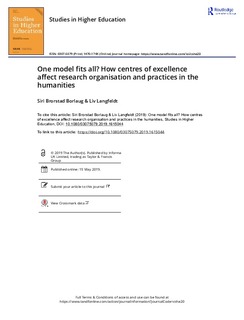One model fits all? How centres of excellence affect research organisation and practices in the humanities
Journal article, Peer reviewed
Published version

Åpne
Permanent lenke
http://hdl.handle.net/11250/2598046Utgivelsesdato
2019-05-15Metadata
Vis full innførselSamlinger
Originalversjon
Borlaug, S. B. & Langfeldt, L. (2019). One model fits all? How centres of excellence affect research organisation and practices in the humanities. Studies in Higher Education, 1-12. 10.1080/03075079.2019.1615044Sammendrag
Centres of Excellence (CoE) have become a common research policy instrument in several OECD countries the last two decades. The CoE schemes are in general modelled on the organisational and research practices in the natural and life sciences. Compared to ‘Big science’, the humanities have been characterised by more individual research, flat structures, and usually less integration and coordination of research activities. In this article we ask: How does the introduction of CoEs affect the organisation of research and research practices in the humanities? By comparing Norwegian CoEs in different fields of research and studying the specific challenges of the humanities, we find that CoEs increase collaboration between different fields and make disciplinary and organisational boundaries more permeable, but so far they do not substantially alter individual collaboration patterns in the humanities CoEs. They further seem to generate more tensions in their adjacent environments compared to CoEs in other fields.
